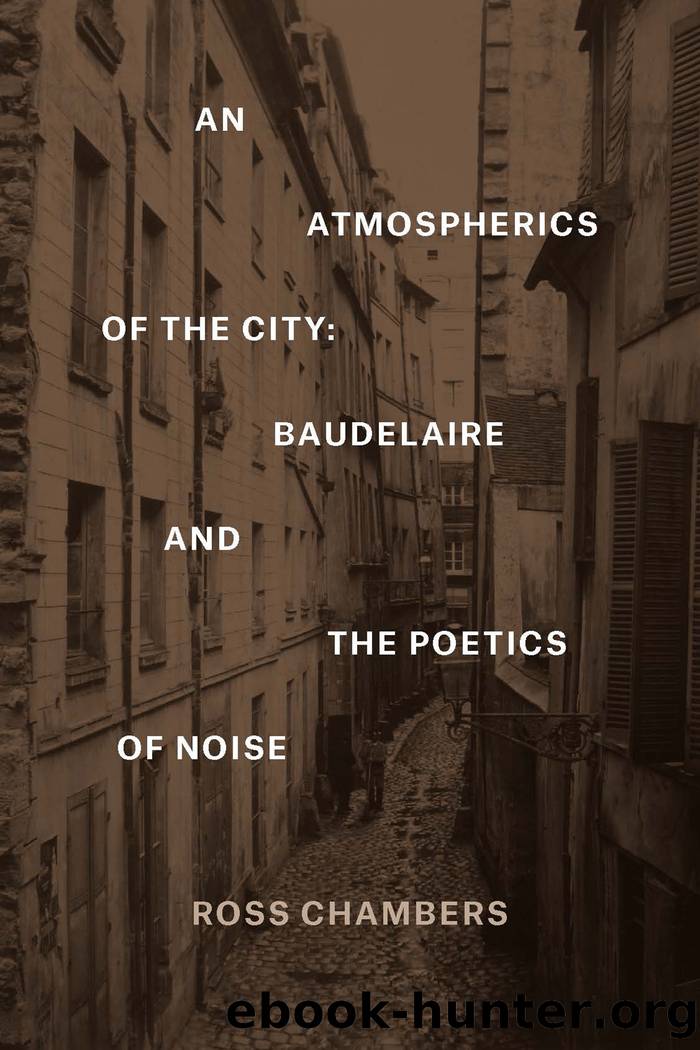An Atmospherics of the City: Baudelaire and the Poetics of Noise by Ross Chambers

Author:Ross Chambers [Chambers, Ross]
Language: eng
Format: epub
ISBN: 9780823266739
Google: pS8gngAACAAJ
Publisher: Fordham UP
Published: 2015-09-15T23:08:10.628603+00:00
âLes sept vieillardsâ
The mutual interference of the oneiric in the everyday, like that of the ordinary in the uncanny, produces in the city a permanent expenditure of energy: a reverberation of noise like that so amply signaled, in line 12:2 âLe faubourg secoué par les lourds tombereaux,â by the lineâs rhythmic regularity (3â3/3â3), its repeated vowel (âfaubourg,â âsecoué,â âlourdâ), its association of b and r (in âfaubourgâ and âtombereauxâ) in a way reminiscent of the words âbrumeâ (line 6) and âbrouillardâ (line 9), and finally, of course, by the presence of the word âtombeâ in the âtombereauxâ that are themselves reminiscent of the revolutionary Terror. In this respect, the line functions as a first fulfillment of the implications of the opening chiasmus: âFourmillante cité, cité pleine de rêves,â which furnishes in its opening syllable, and the mouillement of its first word, much of the phonetic and even thematic material of the lines that follow. What intervenes, however, in the poemâs three opening quatrains, is on the one hand the vision of a city become waterlogged to the point of extremityâits air space invaded by âbrumeâ and âbrouillard,â its streets become âcanaux étroitsâ brimming with mystery, the houses simulating âles deux quais dâune rivière accrueââand on the other the narrative corresponding to this âdécor semblable à lââme de lâacteur,â the account of the poet-speakerâs soul, similarly penetrated by debilitating noise in the form of an invasive lassitude, a loss of moral energy. The cityâs atmosphere, clogged with watery particles as it is crowded with people and dreams, itself exerts a deleterious effect on the morale of one whoâin this respect not unlike the poet of âLe soleil,â fencing his way âle long du vieux faubourgââseeks to resist the power of its entropic liquefaction, and to refuse or ignore the significance of its anonymous, fragmented and fragmenting multiplicity, the meaning of its threatening omnipresence as the weather of the âfourmillante cité.â
When the first of the spectral old men suddenly pops up, then (lines 13â17: âTout à coup, un vieillard . . . / Mâapparutâ), his apparition signifies the final disintegration of the subjectâs remaining will to resist the all-penetrating atmosphere, that is, the moment of his disalienation, when a certain cosmic state of affairs can no longer be ignored or denied. This âspectre en plein jourâ appears, then, as a kind of condensation of the ambient atmosphere or an emanation from out of its damp fogginess, as is suggested by the match of the color of his rags with that of the âciel pluvieux,â and by the prevalenceâin the description of his appearance (which âaurait fait pleuvoir les aumônesâ were it not for the evil gleam in his eye, with its âprunelle trempée dans le fielâ)âof a lexicon of dampness and saturation (lines 14â16). The angularity of his physique, meanwhileâit makes him look âcassé, son échine / Faisant avec sa jambe un parfait angle droit,â while his stick gives him the appearance, and the clumsy gait, âDâun quadripède infirme ou dâun juif
Download
This site does not store any files on its server. We only index and link to content provided by other sites. Please contact the content providers to delete copyright contents if any and email us, we'll remove relevant links or contents immediately.
The Power of Myth by Joseph Campbell & Bill Moyers(1057)
Half Moon Bay by Jonathan Kellerman & Jesse Kellerman(979)
Inseparable by Emma Donoghue(976)
A Social History of the Media by Peter Burke & Peter Burke(976)
The Nets of Modernism: Henry James, Virginia Woolf, James Joyce, and Sigmund Freud by Maud Ellmann(900)
The Spike by Mark Humphries;(809)
The Complete Correspondence 1928-1940 by Theodor W. Adorno & Walter Benjamin(783)
A Theory of Narrative Drawing by Simon Grennan(775)
Culture by Terry Eagleton(771)
Ideology by Eagleton Terry;(733)
World Philology by(712)
Farnsworth's Classical English Rhetoric by Ward Farnsworth(711)
Bodies from the Library 3 by Tony Medawar(707)
Game of Thrones and Philosophy by William Irwin(707)
High Albania by M. Edith Durham(699)
Adam Smith by Jonathan Conlin(687)
A Reader’s Companion to J. D. Salinger’s The Catcher in the Rye by Peter Beidler(686)
Comic Genius: Portraits of Funny People by(649)
Monkey King by Wu Cheng'en(647)
